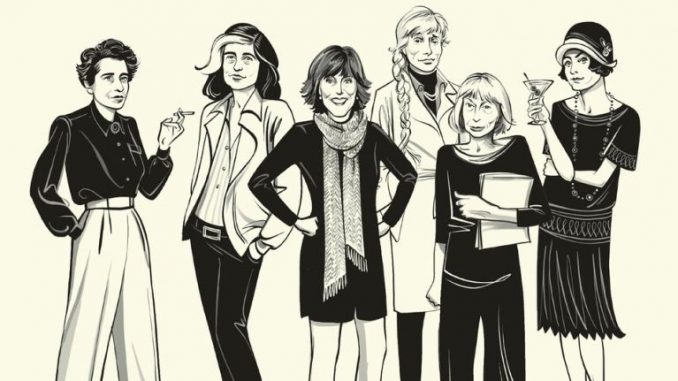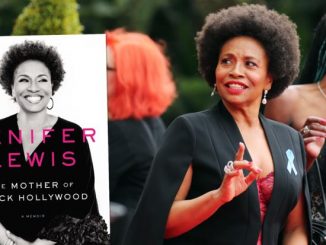
This book should be better. It should be racy and effervescent and captivating. It should be filled with eye-opening quotes that you can’t wait to share with your friends. Instead, a book that explores the professional lives of some of history’s most provocative essayists and theorists is slow and a bit plodding and even boring in patches, even though the women who are its subject are none of those things.
In “Sharp: The Women Who Made an Art of Having an Opinion,” cultural critic Michelle Dean explores the work of a group of female writers who, over the course of their lives, were known for pointed and illuminating commentary. Sometimes they were in agreement on topics such as feminism — mostly in their refusal to swear allegiance to its strict tenets. At other times, they were vehemently at odds or riven by professional jealousy. But they were never dull.
[Comedy writer Nell Scovell walked away from Letterman — and thrived]
Some of them, such as Dorothy Parker and Nora Ephron, have had their work, over time, distilled to a famous phrase or a singular work. They have become pop-culture icons: Parker is recalled for the Algonquin Roundtable, Ephron for her sassy romantic comedies. Others, such as Susan Sontag and Pauline Kael, have been hailed as trailblazers. There are intellectuals such as Hannah Arendt and journalists Janet Malcolm, Renata Adler and Joan Didion. And rounding out Dean’s formidable group are critics Rebecca West, Mary McCarthy and Lillian Hellman.
They are women who, in their prime, were determined not to be ignored, and they created a body of thoughtful criticism, tough analysis and tart essays. They refused to bite their tongues to make themselves more palatable to a world that expected women to be genteel. These women are smart, rebellious and witty.
Who wouldn’t have wanted to have cocktails with Ephron, who mused about her breasts, questioned the sisterhood and turned her divorce into a novel that became a movie? Who wouldn’t have been invigorated by a little intellectual roughhousing with Arendt, who set a controversial standard for political theory?
And yet, in “Sharp,” too many of these women feel muffled, their personalities fuzzy — never clearly delineated.
Dean admits in her preface that she didn’t choose a diverse group of women, which probably explains why their professional lives — as well as their personal ones — often seem claustrophobic and why the narrative at times feels like it’s circling in on itself.
“It was not so much that these women were always in the right. Nor that they are themselves a perfect demographic sample. These women came from similar backgrounds: white, and often Jewish, and middle-class,” Dean writes in her preface. “In a more perfect world, for example, a black writer like Zora Neale Hurston would have been more widely recognized as part of this cohort, but racism kept her writing at the margin of it.”
While it’s true that Hurston’s work did not appear in the same East Coast journals as that of her contemporaries and she did not frequent the same parties, she was thinking and writing, nonetheless. And one wishes that Dean had taken more than a cursory glance at what Hurston had to say, or perhaps added someone like Alice Walker, Toni Morrison or Roxane Gay to her list of sharp-tongued writers. Such an addition might have made this book better.
But it would not have remedied what makes “Sharp” disappointing. Too much time is given to diagramming the love lives of these women and the ways in which their intimate relationships held them back or propelled them forward. “Over the next few months, [Parker] ran into Hemingway more than once on the Continent, in France as well as in Hemingway’s beloved Spain. And she clearly began to grate on Hemingway’s nerves. Exactly what happened on that ship, and later in Spain and France as Parker and Hemingway met and talked, is lost.”
Dean spends a lot of time lamenting these “lost” moments, but really, they don’t seem like details worth mourning.
“Sharp” is intermittently compelling, most notably when it settles into the story of one of these singular women and spends time not just recounting her background, but giving it context and bringing it to life. It’s at its best when it focuses on what made these women significant: their words.
It’s interesting to hear about the intellectual firepower that Arendt brought to political theory, and the ways in which her devotion to a theoretical and a certain misguided humanism led her into treacherous territory with a late-1950s argument against school desegregation:
“To understand the nature of Arendt’s objection to school desegregation, you must also understand that by 1959, her political theory took a tripartite view of the world. At the top was politics, in the middle was society, and at bottom was the private sphere. In the political sphere, she conceded, it was not only acceptable but imperative to legislate against discrimination. But Arendt was convinced that the private sphere needed to be protected at all costs from any kind of government intrusion. She was equally certain that the social world should be left relatively alone by the government, so that people could manage their own links and associations with each other.”
The chapter about Kael is especially engaging in that it tells the story of a writer who did not come into her own, with all the attendant professional and financial stability, until she was nearly 50. And perhaps because Kael’s style of writing is far more direct and unencumbered than, say, Arendt’s, her words give “Sharp” a needed jolt of light energy.
So many of these writers seem to have honed their skills under the indulgent gaze of the editor William Shawn at the New Yorker, at a time when Kael could, in 1967, publish a 7,000-word essay on the film “Bonnie and Clyde.” It’s easy to make an argument that devoting so many words to the consideration of a pop film would rightfully not be tolerated today. But it is also true that what Kael had to say about it was fascinating because of what the film said about American culture. And in being willing to dissect a film with such thought and in being willing to publish her words, Kael and the New Yorker helped to transform the way in which all of us consume cinema.
[Four women who ‘changed our world’]
Malcolm is the last of the writers Dean considers — another New Yorker journalist. But a paragraph from a 1970 essay Malcolm had published in the New Republic has striking resonance today.
“In any case, a woman who chooses to put her baby in someone else’s care so she can pursue a career shouldn’t be hypocritical about her decision and tell herself that she is doing it for the sake of the child. She is doing it for herself. She may be doing the right thing — selfish decisions are often the best decisions — but she ought to see what she is doing and be willing to pay the price in affection that parental neglect often exacts.”
Nearly 50 years after Malcolm wrote that, there is still a lot to chew over in that paragraph.
That female writers could now follow similar routes to prominence is questionable. Compared with today, it seemed that they had so many more outlets not only willing to publish their musings but also to give them the time to sort things out. And it remains unsettlingly true that women of color largely remain at the margin of the intellectual dialogue in whatever form it exists.
Still, “Sharp” is buoyed by its subjects. These women broke through. And they offered trenchant observations and analyses that remain relevant and instructive.
By Michelle Dean
Grove. 362 pp. $26






